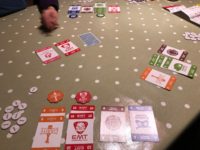- Learning time
- 20 minutes
- First play time
- 40 minutes
Startups
Designed by: Jun Sasaki
Startups is a game about – well, startups. Six companies to be specific, over which you the players will be fighting over – if you have the most shares in a company at the end of a round, any player with less shares must pay you for every share they own.
Outside of a few tokens the game is essentially a deck of cards representing the companies in sets numbering from five up to ten. The number itself refers to how many cards are in each set, not how much profit you can make!
Five cards are randomly removed from the game, the players are dealt three cards and given ten coins, the ‘1’ side showing face-up and the ‘3’ side face-down. On your turn you must do precisely two things: pick up a card, and play a card. It actually helps here, though, if we jump ahead to playing a card first.
You can play a card from your hand either into your play area or to the market, which is a shared space with all the other players. Your own area is a kind of investment portfolio – shares you have in each company. You want to do this because with no shares, you have no chance of scoring points. The catch is that shares you don’t have a monopoly on – literally: there is a monopoly token for each company’s current majority share owner – will count against you and force you into paying cash to the monopoly holder. So that’s why you might decide to play into the market instead, and let someone else have the card in question…
Which means when you pick up (-before playing, remember!) there may be one, two, or even more face-up cards in the market. These can be picked up for free by anyone except the current monopoly token holder: they are not allowed to pick up face-up cards they hold a monopoly on: which means the monopoly tokens can, and often do, change ownership during play. If you want to take the top card from the deck instead, you must place a coin on every face-up card in the market for the privilege. Exception: the benefit of being a monopoly holder however is that although you can’t pick up the card you want, you don’t have to place a coin on it either. But if you decide to pick up a card with coins on it, you get the coins as well!
And that is the game – except to say at the end of each round cards left in your hand get added to your play area – whether you like it or not. And in scoring, when coins must paid to the monopoly holders by anyone with a lesser share in that company, the coins are flipped over to their ‘3’ side, suddenly tripling in value. This devious little catch can have game-changing effects, for better or worse (usually both!) Points are scored for the cash-rich (2pts for first, 1pt for second) and the most destitute player gets -1 point before everything resets for the next round. After four rounds, the player with the most points is the winner!
Joe says
Another great Oink game in a tiny box. Startups is a clever little stock-taking game with some neat mechanisms. Economic!
The guru's verdict
-
Take That!
Take That!
There's no arbitrary take-that-ery because every decision you make is to further your own standing in the harsh world of venture capitalism. But there are certainly moments that can smart.
-
Fidget Factor!
Fidget Factor!
Startups, like a number of Oink games, can bamboozle you at the start. But once everyone is familiar with the concepts the game begins to rattle along at pace.
-
Brain Burn!
Brain Burn!
The rules are light, albeit not the most intuitive ever, but decisions are never easy. When to strike out and claim a monopoly? When to bite the bullet and pick up a card you don't want because you're running low on cash?
-
Again Again!
Again Again!
What we like about Oink's particular brand of mildly-demented chicanery is that you can never truly 'know' the game because so much is about the player's decisions rather than a narrow set of parameters such as the flip of a card or roll of a die.














Sam says
It's another Oink game! The mad geniuses behind such wonderful publications such as the social deduction of Insider and A Fake Artist Goes to New York, the mad scramble of saving trinkets from a sinking ship in Flotsam Fight and the frankly weird wrestling game Maskmen. It reminds me most of the latter - relatively simple rules (once you know them) proving a playing space where decisions are not easy: the game retains a delicious inscrutability no matter how many times you've played it. There's no zero-sum maths here, because every round five cards are excluded and nobody knows which ones they are. The flipping of coins when the companies pay out is a touch of genius, and the whole thing is laced with a weighty sense of should I/shouldn't I that informs almost every choice you make. It's probably a bit too out-there to be a real hit as a family game, but some folks are going to get a kick out of this. I'd add though that although the game officially plays 7 it's probably at its best with three or four players.